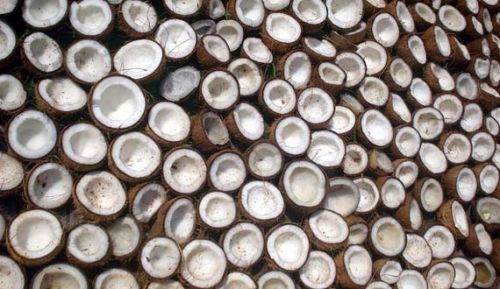
Company Information
Ask for more detail from the seller
Contact SupplierMaking copra removing the shell, breaking it up, drying – is usually done where the coconut palms grow. Copra can be made by smoke drying, sun drying, or kiln drying. Sun drying requires little more than racks and sufficient sunlight. Halved nuts are drained of water, and left with the meat facing the sky; they can be washed to removed mold-creating contaminants. After two days the meat can be removed from the shell with ease, and the drying process is complete after three to five more days (up to seven in total). Sun drying is offer combined with kiln drying, eight hours of exposure to sunlight means the time spent in a kiln can be reduced by a day and the hot air the shells are exposed to in the kiln is more easily able to remove the remaining moisture. This process can also be reversed, partially drying the copra in the kiln and finishing the process with sunlight. There are advantages and disadvantages in both – starting with sun drying requires careful inspection to avoid contamination with mold while starting with kiln-drying can harden the meat and prevent it from drying out completely in the sun. In India, small but whole coconuts can be dried over the course of eight months to a year, and the meat inside removed and sold as a whole ball. Meat prepared in this fashion is sweet, soft, oily and is cream-coloured instead of being white. Coconut meat can be dried using direct heat and smoke from a fire, using simple racks to suspend the coconut over the fire. The smoke residue can help preserve the half-dried meat but the process overall suffers from unpredictable results and the risk of fires.
Copra, the dried kernel is the chief commercial product from coconut, which is mainly used for oil extraction. Copra normally has an oil content varying from 65 to 72 percent. We offer 2 types of copra namely milling and edible are made in India. Milling Copra is used to extract oil while edible grade of copra is consumed as a dry fruit and used for religious purposes. This Coconut Copra is also used in various cuisines to make plethora of dishes. Our range of copra is known for their high nutritive values and quality.
Copra is sun dried or dried using special copra dryers and is available in the following forms,
| Ball Copra | Halfcut Copra | Milling Copra | |
| Specifications Style | Dried | Dried | Dried |
| Type | Coconut | Coconut | Coconut |
| Taste | Sweet | Sweet | Sweet |
| Shape | Ball | Half Cut | Unshaped |
| Drying Process | Sun Dry | Sun Dry | Sun Dry |
| Preservation Process | Sun Dry | Sun Dry | Sun Dry |
| Cultivation Type | Common | Common | Common |
| Max Moisture % | 7 | 7 | 7 |
| Certification | Apeda | Apeda | Apeda |
| Place of Origin | Tamilnadu, India | Tamilnadu, India | Tamilnadu, India |
| Brand Name | Buyer's Brand | Buyer's Brand | Buyer's Brand |
| Model Number | Ball Copra | Halfcut Copra | Unshaped milling Copra |
| Oil Content | 69% min | 69% min | 69% min |

